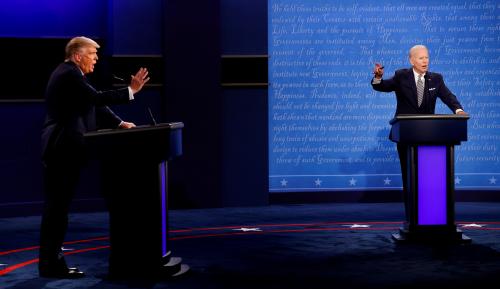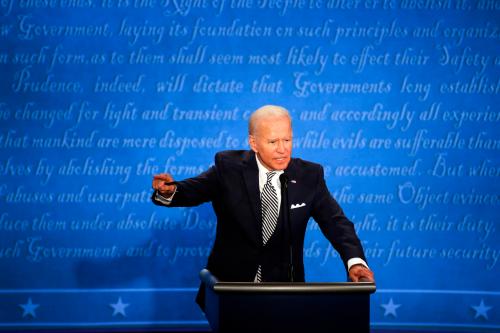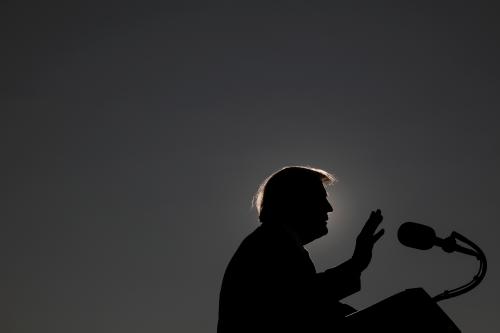President Trump’s problem this election is that fearmongering about imaginary threats works only when the world is a fairly safe and stable place, argues Thomas Wright. “His strategy falls flat when the world is being torn apart by a pandemic and a recession and all he is doing is pointing at shadows on a wall,” according to Wright. This piece originally appeared in The Atlantic.
Last night’s presidential debate was originally supposed to be about foreign policy, but after Donald Trump pulled out of the second debate, the moderator changed the agenda, and national security formed only a small piece of it. The consensus among foreign-policy analysts on Twitter is that we learned nothing. But the debate was more revealing than it appeared.
Trump has trafficked in fear for decades, trying to frighten Americans about things that hardly exist—modern-day Communists, immigrant caravans from Central America, allies who con America into defending them for free. Now he is being undone because he is telling people that what they are genuinely terrified of is actually fine.
The coronavirus has claimed more American lives than World War I, the Vietnam War, the Iraq War, and the Afghan War combined. It is the No. 1 national-security threat facing the country right now. Trump said he survived the virus and the country must learn to live with it. If he wins, he basically told us, nothing will change. We will just wait for the vaccine as hundreds of thousands more Americans die. He did not even pretend to be interested in the reforms the country will need so we are better prepared to deal with the next pandemic or the myriad national and international problems—including how to cooperate on public health with a Chinese regime that refuses to be transparent—that will arise after the pandemic.
The pattern repeated itself on the other national-security questions—if a problem does not fall into a very narrow set of issues that Trump has been obsessed with, then it does not merit discussion, let alone action.
Just consider the question NBC’s Kristen Welker asked about how the candidates would respond to election interference from Russia and Iran, a significant enough threat that Trump’s top intelligence and FBI officials held an urgent press conference on Wednesday evening, alerting the American people to covert operations by those countries.
Former Vice President Joe Biden answered that any country that interferes in the election, whether to help or hurt his chances, “will pay a price.” “They’re interfering with American sovereignty,” he said. His response was in line with an important but somewhat overlooked statement he made in July, when he sought to deter America’s enemies from meddling in the election. He then accused Trump of not pressing Russian President Vladimir Putin on the matter.
Trump started his answer by accusing Biden of getting money from Russia and proceeded to say that the countries interfering wanted him to lose. He said absolutely nothing to warn Russia, Iran, or any other country against intervening. Again, it was as if the problem did not exist.
Election interference cannot be stopped by targeted sanctions of the kind imposed after 2016. Stopping interference requires a massive effort to strengthen the resilience of our electoral system and a willingness to put the country’s overall relationship with Russia or any other aggressor at risk if they interfere in an election. Trump refuses to accept either element. He won’t even discuss the Russian threat with his intelligence officials, because he sees the mere mention of it as a political attack on him personally. And besides, he has accepted Putin’s word that he didn’t interfere in 2016.
When confronted with the fact that his family-separation policy means that 545 children may be permanently kept from their parents, Trump offered not one word of empathy or regret. He just offered false statements about the circumstances of their arrival in the country and dubious assurances that the conditions of their detention were excellent. Yet again, this problem—a cruel and horrific act—just did not exist for the president.
Trump has been talking about foreign-policy issues for 35 years. He has been president for nearly four. We know what makes him tick and what he cares about: He believes that the United States is getting ripped off by the rest of the world. He sees allies, trade deficits, and immigrants as the primary national-security threats facing the country. Beyond that, everything is hyper-personal. He likes leaders who are not accountable to parliaments and can deal with him man-to-man (and, yes, he always likes the “strong” men, never the smart women). This process of hyper-personalization will accelerate in a second term. He won’t suddenly develop an interest in tackling pandemics, preventing the erosion of American democracy, or addressing climate change.
His problem this election is that fearmongering about imaginary threats works only when the world is a fairly safe and stable place. His strategy falls flat when the world is being torn apart by a pandemic and a recession and all he is doing is pointing at shadows on a wall.
The Brookings Institution is committed to quality, independence, and impact.
We are supported by a diverse array of funders. In line with our values and policies, each Brookings publication represents the sole views of its author(s).









Commentary
Real problems do not exist for Trump
October 26, 2020